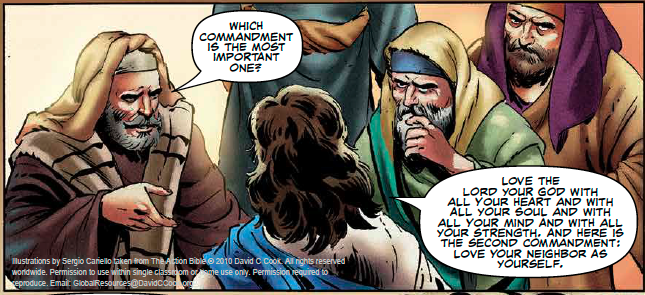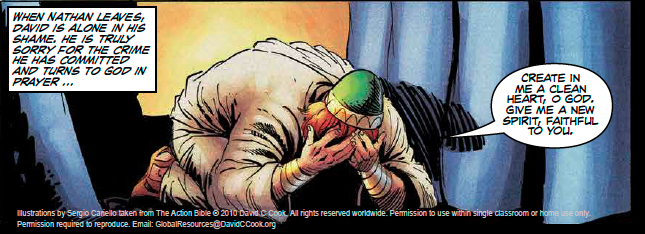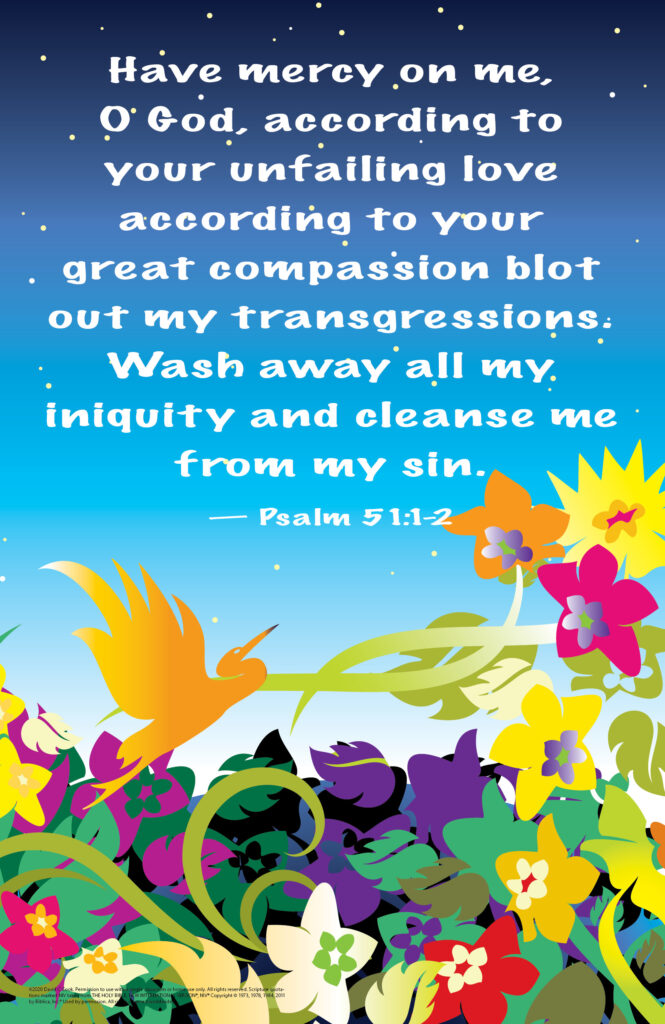During the lesson, the information for you to know is written in regular type, and what we suggest speaking or reading aloud to children is in bold. All resources for this lesson, including the Teacher Guide, Student Page, Family Connection Card, and other resources can be downloaded in a ZIP file by clicking on the following link:
In some lessons you will find "resource articles." These are articles written by experts from around the world to help equip you for your work with children and adolescents. Share them with parents or guardians if you consider it appropriate.
If we confess our sins, he is faithful and just and will forgive us our sins and purify us from all unrighteousness.
1 John 1:9
It is difficult to forgive those who have mistreated us. It can be equally difficult to ask for forgiveness from those we have mistreated. Though God does not specifically command us in the Bible to ask for forgiveness from others, each sin we commit against others is ultimately a sin against God. In His infinite wisdom, He knows that the only way we can experience a loving relationship with Him is by confessing our sins to Him and by asking for forgiveness from others.
Is there someone in your life whose forgiveness will lighten the burden on your heart? Is there someone who has been hurt by your choices and could begin to heal through your apology? You can show God’s love by asking for forgiveness. Though confessing your wrongdoings to another person does not guarantee you will receive forgiveness from that person, confessing your sins before God can transform your heart. He is loving and good and influences us to be loving and good. Only His love can cleanse us of our past sins, and only His love can help us to change our behavior in the future.
As you prepare for the lesson, ask God to give you a heart of humility, repentance, and forgiveness. Ask Him to help you to open the doors of forgiveness for your students, many of whom are dealing with deep issues of abandonment, betrayal, persecution, pain, and loss. Pray that God will help you to share with them that true forgiveness comes from Him. His love can heal all of their wounds.
Encourage the students to ask their family members for forgiveness for something like forgetting a chore or speaking unkindly. Once they know how it feels, they may want to ask for forgiveness more often.
Teacher Tip: If possible, email or text the Family Connection Card to the families of your students.
Welcome your teens. Ask if any would like to share how learning about forgiveness has helped them to begin to heal from their past hurts. As they arrive, hand each of them a longer stick. Divide them into groups of 4–5 for the first activity. Ask each group to sit or stand in a circle.
When you arrived, I gave you a stick. Look carefully at your stick now. Look at how long it is. Is it straight or crooked? Look carefully for details such as leaves, smaller twigs, or knots on it. What makes your stick unique?
Give the students a moment to observe their sticks.
Now pass your stick to the person to the right side of you. Break off a small piece of the stick you are holding in your hand. Then pass the stick to the next person. The next person will do the same thing. Repeat this until the sticks have been returned to the original people.
Students may answer: The others broke it and damaged it. Now it does not look the same.
Answers may include: They cannot be repaired. They are broken permanently.
It damages a person. The wounds caused by these actions cannot be repaired.
When we do something wrong, it usually affects someone else. For example, sexual impurity dishonors the other person, and stealing involves taking something of value from someone else. Let’s talk about how our actions can damage others. Imagine that the stick in your hand represents you.
Students may answer that it hurts when mean or unkind things are done to them. They may also say that they wanted to hurt others because they were hurt.
Students may answer that they feel guilty about hurting someone else or that the others hurt them so they deserved to be hurt too.
When we are hurt, we often spread our anger to others—the people who hurt us or, more often, other people. This causes a cycle that causes even more pain.
Ask the students to put their sticks aside. They will need them for the closing activity.
Sometimes we hurt other people without intending to. We do something selfish, angry, or prideful and do not think about how our actions will affect someone else. Sometimes we hurt other people on purpose. We are hurting, so we want them to hurt too. Whether we caused the hurt on purpose or without intending to, hurting others damages our relationships. But there is a way to help repair our relationships with others. We can ask for forgiveness.
Ask the students to find partners and share their answers to the following questions. Let them know that they do not have to give details about what happened, only the answers to the questions. Give them 3–4 minutes to discuss their thoughts.
Asking for forgiveness can bring reconciliation. This means that the relationship with the person we have mistreated has been restored. The person forgives us, and our relationship continues. But even if our relationships are not restored, we should still ask for forgiveness.
One reason to ask for forgiveness is that God wants us to treat others with love. He loves each of us, and His purpose for us is to love Him and love each other. Jesus made this point clearly in this passage.
Ask a student to read Matthew 22:36–39 aloud from the Bible. Show The Action Bible image if possible.

“Teacher, which is the greatest commandment in the Law?” Jesus replied: “‘Love the Lord your God with all your heart and with all your soul and with all your mind.’ This is the first and greatest commandment. And the second is like it: ‘Love your neighbor as yourself.’
Matthew 22:36–39
It is God’s plan for us to love Him. He loves us, and He wants us to love Him.
God loves all of us, so He wants us to treat each other with love. Also, if we love God and treat others with love, the world will be more like God planned it to be.
Whenever we treat each other unkindly and disrespectfully, it hurts God, because He loves each one of us.
God knows that we often hurt others. He also knows that our lives would be better if we treated each other with love. One way to treat others lovingly is to ask for forgiveness when we have hurt them.
King David wrote about a time when he confessed his sins to God and asked for forgiveness. When you need to ask for forgiveness, you can pray the way he did.
Show The Action Bible image of David asking God for forgiveness as you read the verses from your Bible.

Ask a student to read Psalm 51:1–4 aloud from the Bible.
Have mercy on me, O God, according to your unfailing love; according to your great compassion blot out my transgressions. Wash away all my iniquity and cleanse me from my sin. For I know my transgressions, and my sin is always before me. Against you, you only, have I sinned and done what is evil in your sight; so you are right in your verdict and justified when you judge.
Psalm 51:1–4

He felt guilty and regretted his sins. He admitted that what he had done was wrong. He knew he deserved to be punished.
He had sinned against God.
He asked God to forgive him.
Once we realize we have hurt someone else, we should ask God for forgiveness. Then we should ask for forgiveness from the person we have wronged. Even though David had sinned against another person, he knew that first he needed to ask for forgiveness from God. He realized that all sin is actually sin against God.
When you need to forgive someone, talk with God about what happened and ask Him to help you make things right. Here are some steps to asking someone to forgive you.
First, think about what you might have done wrong to hurt the other person. Do not try to justify what you did. For example, you may have embarrassed a friend when you shared something she told you privately.
Next, think about why you did what you did. For example, if you shared something a friend told you privately, did you do it because you wanted others to care for her and understand her difficulties? Or did you want to make her feel embarrassed or hurt?
Then think about how your actions made the other person feel. In the example we have been discussing, your friend may have felt embarrassed and angry.
No matter what you did, why you did it, or how your actions made the other person feel, it is always important to pray and ask God to help you understand what you did wrong.
Then go apologize to that person, if possible. Say something like, “I am so sorry. I was wrong. Please forgive me.” Be specific, if possible. For example, to apologize in the example situation, you might say, “I am so sorry I shared that information you told me privately. I was wrong. Please forgive me.”
Asking for forgiveness is not an easy thing to do. In fact, trying to fix a broken relationship can be almost impossible. True reconciliation requires God’s help. Only through Him can we understand what true forgiveness is, because He has shown us forgiveness through Jesus.
Invite your teens to pick up their sticks from the activity you did at the beginning of the lesson. Give them each a second, shorter stick.
Look carefully at your stick now. It is broken. Other people damaged it, and it cannot be repaired. But Jesus can help heal and restore us as we ask for forgiveness.
When we ask for forgiveness, we are working to repair the relationship broken by our wrong actions. Though we can never erase what we have done, we can start the healing process for ourselves and others by apologizing for what we have done wrong.
Tell the students that they will create a cross from what is left of their original sticks and the new sticks. Show them how to tie the sticks together with the string so they will stay in place. You will need to wind the string in an “X” shape and tie the ends in a knot to hold the sticks together.
When we ask for forgiveness and God’s help, it does not make what we did go away. But it may help to restore the relationship. This cross can remind us that God wants us to heal our relationships by showing love to others and asking for their forgiveness.
Optional: If you are using the Student Pages, your students can write their thoughts on the pages.

Think of someone whose forgiveness you need to ask for. It may be someone you have wronged accidentally by behaving in an unkind or selfish way. It may be someone who has been hurt by your pride or your anger. It may be someone who hurt you so you hurt him in return. As you hold your cross, think of that person. Imagine asking for his forgiveness. Pray to God and ask Him for His help to reconcile the relationship. Ask for His strength to talk with the person about what you have done. He will give you courage and humility to help you restore your relationship.
If you are not ready to pray, think about what you can do to reconcile with the other person. Be courageous and humble enough to approach the person. Let her know that you value the relationship enough to ask for forgiveness.
At the end of class, encourage the teens with this blessing based on Psalm 139:23–24:
Blessing: May you allow God to search you and know your heart. As He leads you to discover the relationships you need to reconcile, may He give you the strength, humility, and courage to follow the way everlasting—and may His love for you and for others guide your steps.
Lead your students in singing this quarter’s song if possible.
Life on Life ©2020 David C Cook. Reproducible for home or classroom use only. All other uses require written permission from David C Cook [email protected]. All rights reserved.